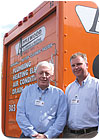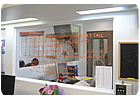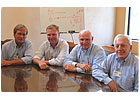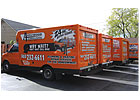
Like almost everyone else in the residential service business, Denver’s Applewood Plumbing, Heating & Electric could use more service technicians. Unlike many companies, it would rather turn away business than hire mere warm bodies.
Applewood runs some 30 service vehicles serving the greater Denver Metropolitan area, including the city of Boulder roughly 25 miles away. About 60 percent of its business comes from plumbing, 30 percent HVAC/hydronics and the rest from an expansion into electrical service work a little more than a year ago.
President and owner John Ward believes Applewood is the largest privately owned PHC residential service firm in Colorado, maybe topped only by those affiliated with franchises or public company roll-ups. Still, it has 10 extra trucks in its maintenance rotation and the company would love to turn some into revenue producers. If Applewood could find enough techs, it would buy more.
The company is constantly on the lookout for more techs, but without compromising rarefied hiring standards. All of Applewood plumbers and electricians must be licensed, for one thing. According to Ward, a close reading of Colorado regulations finds that everyone who performs plumbing or electrical work in a home is supposed to have a journeyman’s license. Enforcement is ignored in favor of a liberalized interpretation of the law that allows companies to get by with unlicensed plumbers as long as the owner or someone else in the company holds a master plumber’s license.
Ward holds one, but Applewood also has three other master plumbers on staff: Joshua Ward, son and co-owner; Mike Taylor, service manager; and Russ Smith, the company’s warehouse/fleet manager and safety officer (see sidebar on page 71).
Nonetheless, Applewood’s policy insists that everyone who works as a plumbing or electrical service tech must meet the state’s requirement for a journeyman’s license in those trades. Nor does it fudge the distinction between plumbing and drain cleaning as is so common around the country. Applewood does employ an unlicensed drain-cleaning specialist, but it uses him only for drain-cleaning jobs, which don’t require a license.
Colorado has no license requirement for HVAC technicians, although the cities of Denver and Boulder do. Applewood makes sure techs who work in Denver and Boulder comply with those requirements. The company also insists that HVAC technicians be NATE-certified.

Tougher Than The Police
Licensing is just the start of Applewood’s fussiness. All of Applewood’s technicians must pass criminal and DMV background screens as well as drug tests. Ward claims Applewood’s screening process is more stringent than the Denver Police Department’s.Drug tests can be subverted by masking agents or other trickery, such as passing off someone else’s urine as one’s own. To guard against being fooled, Applewood hires the most technologically advanced screening labs, and accompanies applicants to the drug-screening facility. It also does random testing of employees, as well as automatic drug testing after accidents.
“Since we implemented drug testing, many problems have disappeared,” Ward comments. “Druggies hang around together and talk at the supply houses. After word gets around that we’re serious about drug testing, they don’t even bother applying to work at this company. As a result, almost all of our applicants now pass the test.”
He also confesses to a bias for clean-cut men and women, preferably with families. “We like ‘normal’ people who do their job, then go home to the spouse and kids,” Ward says. “A lot of single guys have no problem not showing up for work when they don’t feel like it. They tend to be job-hoppers.”
Besides background checks and drug tests, job applicants undergo close scrutiny in job interviews with service manager Taylor - an industry veteran with a keen b.s. radar - as well as the owners. As long-time members of the Nexstar Network (see sidebar on page 68), Applewood draws from proven recruiting and hiring methodologies developed by Nexstar.
With even mediocre service techs in short supply, I asked Ward how he manages to find enough of the caliber of people he’s looking for to sustain a business that he wants to continue growing. “It’s really hard,” he explains. “Ninety percent of the people who apply here can’t meet our criteria. They’re either not licensed, not clean-cut or not drug free. So we really have to work at it.”
That means always being in a hiring mode. Applewood spends some $12,000 a month in newspaper classified ads trying to reach a large mass of people in the hope of attracting one or two with the potential to work for the company.
“We’re one of the most expensive service firms in town,” Ward replies. “Our customers hire us despite that because they know they can count on our people treating them well and not pilfering from their homes. Our identity is that of really professional people doing a really professional job. It’s our job as managers to protect that reputation.
“We’ve experienced little turnover since we insisted that everyone we hire be licensed,” he adds. “We had much more turnover when we operated like everyone else with unlicensed service techs.”

What's In It For The Techs?
Those who do pass muster get rewarded with probably the best pay and perks in their market. Ward revealed that Applewood’s average service tech last year earned $87,000 in pay via a compensation structure that blends hourly wages, sales commissions and profit-sharing bonuses. On the rare occasions when there’s not enough work to keep all the techs busy, they get paid an hourly wage comparable to the going pay scale in the area to do nothing. This doesn’t happen often.They also get handsome benefits that include great medical coverage, a 401(k) plan and tuition reimbursement, along with what Ward calls “odd stuff that nobody else is doing.” For instance, Applewood will pay for the services of a financial planner to help employees with retirement planning. The company also has a unique program they call “Don’t do it yourself.” It grants employees up to $400 a year to spend on PHC or electrical home services with another company.
My first thought upon hearing of this was that it’s a great way to tap into best-practices ideas from other firms. It’s just the opposite. “It teaches our people what a struggle it is to get good service from most companies in our field,” says Ward. “This helps our people appreciate the Applewood methodology and why we have to charge the prices we do.”
Another employee-friendly policy all but eliminates one of the biggest gripes of service techs. Ward remembers his days working with the tools and how much he hated the disruption to family life from emergency calls. So he has taken steps to minimize them for Applewood techs.
The company’s regular service hours are 6:30 a.m.-8 p.m. (8 a.m.-8 p.m. on weekends), all at the same flat rate prices - called “standard pricing” in Applewood parlance. It offers 24/7 emergency service only for “Service Club” members. These are households that have an annual service agreement with the company. The $198 agreement covers an annual clean-and-check, discount pricing and access to 24-hour emergency service. Anyone else calling outside of normal working hours is told to sign up for the Service Club or call elsewhere.
Applewood service techs do submit to on-call rotation. But with a customer base of some 3,000 Service Club households rather than all 2 million people living in the greater Denver area, it’s rare for one to be dragged away from personal activities.
“Our service techs deserve a life, too,” Ward says. “We’re a family-owned business that treats employees as family.”
Elite Service
Well-treated employees will treat customers well, goes the thinking. Top-notch customer service is essential to a premium-priced service firm such as Applewood.“We can’t recruit the best people by charging cheap prices,” Ward explains. “A lot of our business comes from customers who know we will charge more than most firms for a given job. But they also know that if we schedule it for Tuesday afternoon at 2 o’clock, we’ll do everything in the world to get there at that time. Our service tech will show up in a truck that most likely has everything in it needed to do the job - and he’ll be clean-cut and drug-free.”
Applewood service techs show up at customer premises with briefcases, uniforms and ID badges. They put on plastic booties before entering to avoid tracking in dirt.
A curious quirk of this company’s uniforms is that they consist of simple blue work shirts that bear no Applewood insignia. Instead, the company is identified along with the individual’s name and license number in big lettering on the ID badges. “We try not to look like plumbers,” Ward explains. Everyone in the company who visits the field - owners and managers included - wear the same unadorned work shirts and ID badges.
Applewood in the early-1990s was the first PHC service company in Colorado to go flat rate, to the best of Ward’s knowledge. Now flat-raters are common in that market - thanks in large measure to Applewood’s influence. “In 10 years I don’t think you’ll see any more time-and-material service firms around here,” Ward offers. “It simply doesn’t work out economically.”
Premium-priced, flat-rate companies frequently get hounded by consumer protection agencies. Applewood is in good standing with them. In fact, Applewood belongs to Denver’s Better Business Bureau and enjoys that BBB’s certification as a reliable company to deal with. This endorsement is touted on Applewood’s service trucks.
The company does get a few price complaints, Ward says. Mostly these occur after the fact - usually when a competitor who wasn’t available to do the work tells a customer he’d have done it for much less. These complaints almost always get resolved in-house. Each year they dwindle in number and now comprise only about 1 percent of jobs performed.
Perhaps the best indication of the company’s integrity is that about 60 percent of its business comes from repeat customers. People tend not to go back to companies they feel beat up on them in any manner.
Applewood habitually receives Nexstar Select Service® certification. This award is based on audits by the organization to gauge member performance in what Nexstar regards as the three pillars of service industry success: 1) customer satisfaction; 2) employee satisfaction; and 3) financial strength. Only 10-15 percent of Nexstar members receive Select Service status, and Applewood is regularly among them.
The company gives back generously to the community it serves. Applewood has come up with an interesting twist on charitable giving by donating $1,000 each month to local charities and nonprofits selected by customers. Anyone can nominate a recipient via Applewood’s Web site. Each organization nominated gets placed in a drawing for that month’s contribution.

Garish Is Good!
Continued growth is essential to the company’s business plan. Geographic expansion is pretty hard to achieve in Applewood’s mountainous region, so it is fixated mostly on increasing market penetration and expanding services. That’s why it leaped into electrical a little more than a year ago.This growth commitment makes it all the more noteworthy that it has resisted cutting corners by lowering employment or service standards. It takes a lot of marketing to replace customers lost to natural attrition and continually build new business. Yellow Pages advertising comprises the bulk of company marketing dollars, and its marketing efforts are aided in no small measure by some of the most garish service cube vehicles to be found anywhere in the country. Applewood’s bright orange trucks need to avoid passing cemeteries lest they wake the dead!
“I’m pretty much color blind,” Ward confesses. “One day I was driving down the road and noticed this giant orange van line truck. I figured if I could see that, then everyone could. So we had our first truck painted orange and have stuck with it ever since.”
If you look closely at the photo on page 66, you’ll notice the truck signage includes a black stripe running lengthwise at the bottom. That is for ease of maintenance. Applewood’s bright orange paint job is hard to touch up without leaving noticeable splotches. The black stripe below absorbs most damage from rock salt and road debris, and can be painted over with little trace.
Prosperity & Happiness
John Ward is a soft-spoken guy with an unflappable good nature. He faces no fewer problems and obstacles than any other small business owner, but sees none of them as insurmountable.Our conversation turned at one point to the rise of PHC franchise operations and the ill-fated attempts at industry consolidation. “We don’t pay a lot of attention to competitors,” Ward says. “You can really get blindsided trying to copy competitors, because all you can see is the outside. You don’t know what’s going on the inside of their business to drive the way they do things. So if you try to duplicate things they do, it may not work for you.”
The business remains a lot of fun for him, and he can’t think of ever selling it. “Nobody could buy us,” he adds, “because this business provides us with a good lifestyle, and they’d have to replace the income stream for both me and Josh. I’m planning to work for the next 13 years, and Josh will be around for probably 30 or 40 more. When you think of how much we’ll make in that time, it’s hard to see how anyone could afford to give us the price we’d need.”
Another Frank Blau Rescue Project
Like hundreds of other service contractors in the industry, Applewood’s history is a rags-to-riches story that owes its turnaround to former PM columnist and business consultant Frank Blau. Before meeting Blau, John Ward had been working as a plumbing contractor for 20 years doing new construction work and perpetually struggling.“I was a really good plumber, but knew nothing about the business,” he admits. “I was tired of everyone working for me making more money and having better benefits than me.”
A severe recession hit the Denver area in 1991 at a time when Ward was running nine crews plumbing new homes. When that market collapsed, the builders responded by stiffing their subs. Ward was on the verge of losing it all.
Then one day he picked up a copy of PM and read an article by Blau titled, “Make More Money Than You Can Spend.”
“It talked about business and income statements,” Ward recalls. “Next, I went to one of his seminars in Colorado Springs and stopped to talk with him afterward. Frank gave me his phone number to call if I needed more help, and I ended up spending many, many hours on the phone with him.”
This was around the time Blau was in the process of forming Contractors 2000 (C-2000) - an affinity group for PHC service contractors started in 1992, since renamed Nexstar. Blau convinced Ward to get out of the new construction market in favor of service work, and recruited him as one of the earliest C-2000 members.
“I didn’t have any money, but I did have a credit card that allowed me to charge the $5,000 entry fee,” Ward says. Although not recognized as one of Nexstar’s original 16 founders, he was the 15th member of the group. That’s because he got his money in before some of the founders who committed did.
Blau is now retired from the PHC business, but still keeps in touch with Nexstar and close friends like Ward. Applewood has become a Nexstar stalwart. Ward has served on its board and various committees, and all of Nexstar’s managers have tapped into the organization’s vast educational resources. With few deviations, Applewood operates in accordance with the organization’s business and marketing best practices.
Nexstar is a restricted organization in which members have the right to exclude territorial competitors. Long ago Ward purchased the Denver and Boulder territories with that intent, but has since changed his thinking 180 degrees and encouraged other firms to join. At last count there were nine Nexstar members in his territories, and others have come and gone over the years.
“It’s driven up our marketing costs like crazy, because we’re all buying the same Yellow Pages ads,” he says. “That’s kind of a drag. But on the other hand, it’s raised the level of competition and made us all better.
“Nexstar taught us everything,” Ward adds. “And there are not enough ways to say thank-you to Frank Blau for all he’s done for us over the years.”
Safety Is For Service Firms, Too
An unexpected pleasure in covering this story was having an old friend pop up. Russ Smith is the former owner of The Plumbing Experts, a successful plumbing firm based in Boca Raton, Fla., which was the cover subject ofPM’s October 1988 edition.I had not seen him in years, and in the meantime, he and wife Mary had sold that business to follow their daughter and son-in-law in moving to Denver with their first grandchild. It was a natural for him to link up with Applewood, which has a nose for top talent and the wherewithal to pay for it.
Smith serves as the company’s warehouse/fleet manager and safety officer. His duties encompass purchasing and everything else needed to keep those operations running smoothly. However, it was his safety duties that most intrigued me.
That’s because most residential service firms pay little attention to the subject. It’s a big issue with GCs and owners on large construction projects, but many service contractors fail to recognize that hazards abound in their work as well.
“We deal with everything from ladder safety to driver safety, hazardous waste and chemical contact, and basic health issues like staying in shape - everything you can imagine that would affect the well being of our staff,” Smith says. “I even put on an anger management class, because it has an awful lot to do with mental preparedness for dealing with the customer.”
Some safety issues are not readily apparent, even to folks who have been in the field for a while. For instance, it makes sense to wait until after 10 a.m. to service rooftop chillers because morning dew can make the roofs slippery. Crawl spaces are filled with hazards, and the human body is not ideally designed to wrestle plumbing fixtures, water heaters and boilers up and down stairs.
“Safety is something nobody wants to deal with until somebody gets hurt,” Smith adds. “In my opinion, the vast majority of worker comp claims can be avoided. Very few are acts of God.”
Applewood hosts hour-long monthly safety meetings, and sometimes brings in outside experts. For instance, a highway patrol officer recently spoke to service techs about road rage, a potential hazard from both a perpetrator and recipient standpoint. Smith also arranged for the firm’s health care provider to give tetanus booster shots to the techs.
A company the size of Applewood has a lot of exposure, but Smith’s efforts are paying off in a tangible way. The firm’s EMR (experience modification ratio) has gone down, resulting in a worker’s comp insurance discount.